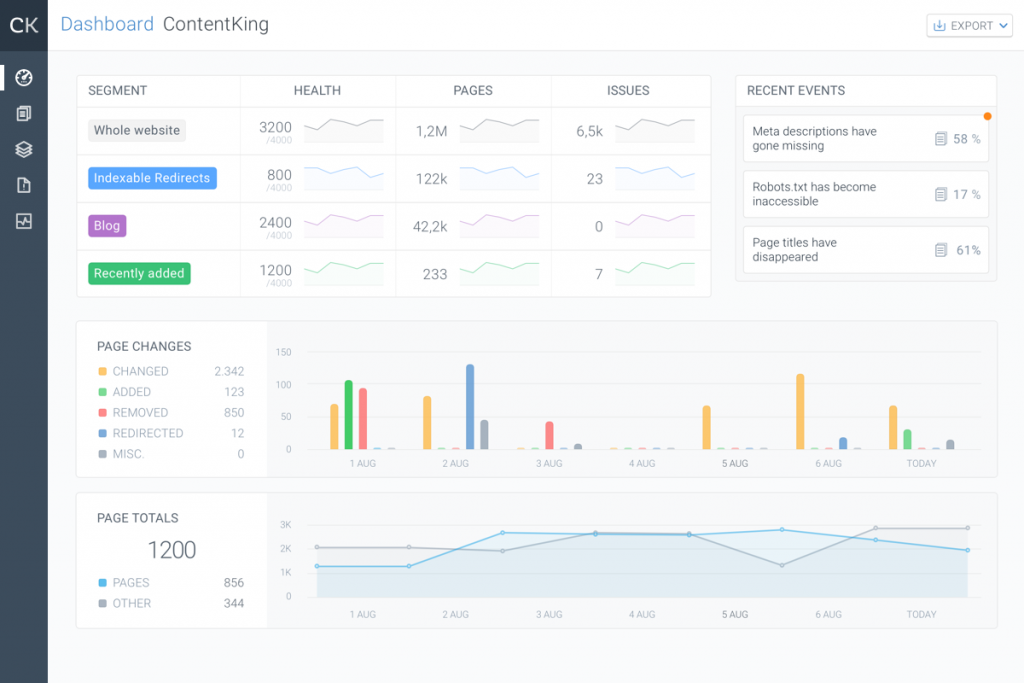—
Search Engine Optimization, “SEO” for short, is a field that’s advancing rapidly. And the SEO market is growing at a fast pace too – it’s supposed to hit $80 billion by 2020. That’s massive, but not surprising, with the rising prices on advertising platforms.
SEO is about winning prominent positions in search engines’ organic listings (the ones you don’t pay them for). From a theoretical viewpoint, the page that ranks in the first position should:
- Be easy for search engines to find and understand
- Provide the best answer to the user’s query
- Provide the best user experience on the page
- Be trustworthy and authoritative
These criteria break down into hundreds, if not thousands of factors. Search engines are pretty open about some of these factors, while remaining secretive about most.
When you’re working on improving the factors that aren’t that clear, it’s easy to forget about the ones that are. And that’s where danger creeps in. You need to consistently work hard to rank well in search engines. Slipping up could mean taking a significant decrease to organic traffic, and in turn losing revenue.
SourceForge has reached Vincent van Scherpenseel, CEO at ContentKing, to talk about the state of SEO and why it’s important to keep a close watch on your website.
Q: What does ContentKing do exactly, and why did you start the company?
A: ContentKing is a real-time SEO auditing and content change tracking platform. This means we’re monitoring your website’s health and keeping track of the changes that impact your SEO performance, in real time.

Vincent van Scherpenseel, CEO, ContentKing
The reason I founded ContentKing is a classic case of “scratching your own itch.” From 2008 to 2015 I was running a digital marketing agency, and our team was finding that our clients were often making significant changes to their websites without telling us. The changes they were making were hurting their SEO performance – which we were responsible for improving.
We’d always find out too late about the changes they made, which led to discussions that, as an agency, you always lose. Customers would – rightfully – ask “Why are you only finding out about the changes we made weeks after the fact? I thought you were keeping an eye on our site?”
To prevent discussions like this, we built an internal tool that continuously monitored our customer’s websites for issues and changes. Soon afterwards we became able to proactively reach out to our customers when we saw they were making changes that would hurt their website’s SEO performance.
We felt others would benefit from our tool as well. Asking around within the digital marketing space showed us we were right. And that’s when we closed down the agency and focused 100% on this tool – which became ContentKing.
Q: What industries do you serve and who are your current customers?
A: Our customer base is roughly divided into two types of customers: enterprise and eCommerce brands, and digital marketing agencies. We serve brands from all industries; the only thing that matters is whether or not their SEO performance is important to their business. If the answer is “yes,” then they should be using ContentKing.
FedEx, Atlassian, Telus, and iProspect are just a few of our customers. Our clients are spread out across the globe, but the largest markets for us are the US and the UK.
Q: Why is keeping tabs on your site in real time important?
A: It’s important because search engine robots are crawling your website constantly. Ideally, when someone messes up, you want to fix it before search engines pick up on it. You want to prevent it from hurting your SEO performance.
Traditionally, SEOs and digital marketers were doing website audits on a monthly basis, and reporting on those sites’ performance monthly as well. That’s the old way of doing and thinking about SEO. But SEO has become a real-time game. And in order to compete, you need to be on top of your game.
How can you be on top of your game if you’re only taking snapshots of your website once a month? You have no clue what’s going on in between those snapshots. For all you know, some pages are getting deleted, and then two weeks later restored, without your noticing. You’re flying blind.
But even if you’re not able to respond to mistakes that quickly, with ContentKing you at least have the information to pinpoint when a nd where something went wrong. With this information you can do a post-mortem, learn from it, and keep it from happening in the future.
Keeping track of your site in real time brings a huge productivity increase as well.
Q: How do real-time SEO data and tracking changes increase productivity?
A: It’s much more efficient to just look at how the website has changed since the last time you looked at it, rather than having to do a full check every time. There’s value in doing this full check 1–2 times a year, but definitely not every month.
When you know your sites are monitored in real time, and you receive alerts when there’s trouble, you can really focus on the task at hand and the things machines can’t do, such as writing quality content and increasing your website’s popularity by doing PR.
Presenting information rather than data helps our customers analyze their website’s SEO performance a lot faster. We’ve found that most of our customers are seeking information rather than data at first, so we give them that – while still making sure the data is accessible if they want it.
This productivity increase leads to much better results for your clients, because you can do a lot more for them within the allotted time.
Q: What are some of the most common use-cases for ContentKing?
A: I’ve already mentioned keep tracking of content changes. We’re often seeing that there’s friction between agencies and clients, but this also applies for the larger in-house teams. Being able to keep track of what pages are being added, changed, or removed is essential.
Another good example is monitoring a website around release time. It’s easy to push more changes live than you wanted to, so being able to compare what you intended to change with what actually changed is a great way of verifying your release was successful.
And something else that we often see happen is the test environment’s robots.txt or robots noindex directives, which prevent search engines from accessing the test environment, accidentally being pushed to production. Those mistakes can be devastating for your SEO performance, so you want to tackle them head on.
Now imagine having to manage situations like these for 30+ websites. If you don’t have the right tooling in place, this only scales by hiring more people – which is an inefficient, inaccurate, and expensive solution to this problem.
Q: How do your customers use ContentKing?
A: It really depends on the customer and their need for information.
So some of our customers have the ContentKing dashboard up on a massive screen in their digital marketing department, showing them what alerts, issues, and changes our platform is detecting.
Other customers use our API to pull specific information, which they then include in their own dashboarding software.
And a lot of our customers are using Slack for internal communication. So they’re using our Slack integration to be notified of high-impact changes and issues. They can configure it as they please, making sure that just the right people are getting just the alerts they’re interested in. Take for example a content team: they’re not interested in seeing technical issues, but they do want to see when a huge content change is made.
For context here: our focus has always been on providing the best possible user experience. Listening to our customers, the challenges they face, and the way they work. This what leads us in the features we build, and how we build them.

Q: Why do you focus so much on the user experience?
A: Poor user-experience design has made most SEO tools hard to use! You need to be quite advanced in the field of SEO to be able to use them. We set out to on a different course, making great user experience our focus from the get-go.
ContentKing’s internal workings are tremendously complex and powerful, but we present all the information in an easy-to-digest way. That way, less tech-savvy people can use this software as well. This makes for better collaboration between teams, which is essential for SEO success.
And education is important as well. Therefore whenever we flag an issue, we explain why it’s important to fix it. If our users want to read on, we refer them from the app to the ContentKing Academy, where we explain everything in detail.
About ContentKing
Made for e-commerce, digital marketing agencies, and other online businesses, ContentKing is a cloud-based service that provides real-time SEO auditing and change management to improve and maintain their search engine visibility and eliminate “surprises” that would otherwise inevitably impact their bottom lines.
